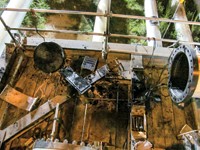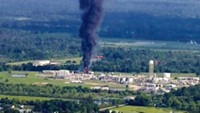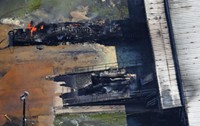Advertisement
Grab your lab coat. Let's get started
Welcome!
Welcome!
Create an account below to get 6 C&EN articles per month, receive newsletters and more - all free.
It seems this is your first time logging in online. Please enter the following information to continue.
As an ACS member you automatically get access to this site. All we need is few more details to create your reading experience.
Not you? Sign in with a different account.
Not you? Sign in with a different account.
ERROR 1
ERROR 1
ERROR 2
ERROR 2
ERROR 2
ERROR 2
ERROR 2
Password and Confirm password must match.
If you have an ACS member number, please enter it here so we can link this account to your membership. (optional)
ERROR 2
ACS values your privacy. By submitting your information, you are gaining access to C&EN and subscribing to our weekly newsletter. We use the information you provide to make your reading experience better, and we will never sell your data to third party members.
Industrial Safety
Texas chemical industry mostly unscathed by Hurricane Beryl
But US chemical safety board warns industry of more storms ahead
by Jeff Johnson, special to C&EN
July 11, 2024
| A version of this story appeared in
Volume 102, Issue 21

Texas chemical companies appear to have avoided serious damage from Hurricane Beryl when it hit the Houston region earlier this month.
Beryl came early in the hurricane season, notes the US Chemical Safety and Hazard Investigation Board (CSB), which investigates and records chemical-related incidents. The CSB warned of possible weather-related storm damage and urged Texas chemical manufacturers to prepare for the rest of the season ahead.
“Storms like Hurricane Beryl challenge safety systems at chemical facilities and reveal underlying problems,” the CSB says in a statement to C&EN. “Although the CSB has not been notified of any chemical releases meeting our reporting criteria due to Beryl, some facilities likely experienced issues that we are not aware of. These facilities should take action to address those problems to ensure they are prepared for the next severe weather event.”
Companies regularly conduct weather-related safety reviews and consider potential responses, as urged by the CSB, note officials with the American Chemistry Council (ACC), a trade association.
Such efforts grew following Hurricane Harvey, an intense storm that hit Texas in 2017 and resulted in extremely high winds and rain, says Rebecca O’Donnell, the ACC’s associate director for process safety and occupational health. One consequence was a fire and the release of toxic material at an Arkema chemical plant in Crosby, Texas.
Companies have individualized response plans, which makes it difficult to broadly characterize the industry’s preparedness efforts, O’Donnell says. But companies don’t operate in a vacuum, and their work is usually assessed collectively through local emergency planning committees and manufacturer associations, particularly in heavily industrial areas like Harris County, where Beryl hit.
O’Donnell adds that companies must recognize the role of employees at chemical facilities when planning for response to severe weather events. Workers are often torn between home and company when a storm attacks. Firms, she says, are increasingly focusing attention on the availability of ride-out crews who must be ready, for instance, to shut down or restart a chemical plant in the face of a severe storm.
“We must remember, people run a chemical facility,” adds Scott Jensen, the ACC’s communications director.
A focus on natural disaster planning was reflected in the US Environmental Protection Agency’s final Risk Management Program regulation, which the agency released earlier this year. Companies that handle high levels of toxic chemicals are now required to assess their vulnerability to natural hazards, hurricanes, and storms, as well as to traditional manufacturing problems.





Join the conversation
Contact the reporter
Submit a Letter to the Editor for publication
Engage with us on Twitter